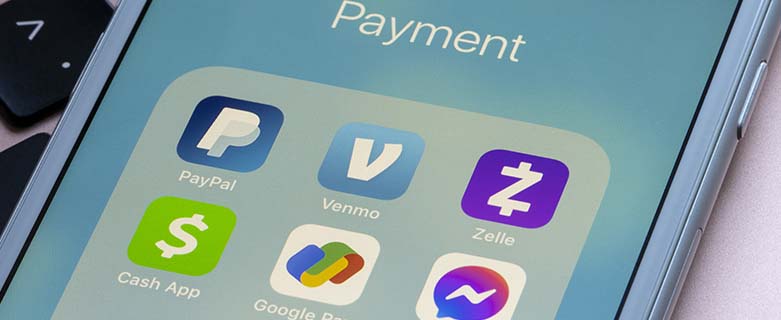
P2P Payment Apps and Chargebacks
By Chris Alarie on Oct 13, 2021
P2P apps are a key, emerging aspect of the payments world. These mobile applications—which derive their name from the terms “peer-to-peer” and “person-to-person”—are largely designed for transactions between individuals. However, they have assumed increased prominence in both legitimate and illegitimate merchant transactions. As a result, P2P apps play an important, and sometimes confusing, role in chargeback management and mitigation efforts.
The three most prominent P2P transaction apps are Cash App, Venmo, and Zelle. These three apps fit broadly into two different categories with regards to P2P payments and chargebacks: apps whose primary role in retail and merchant payments is to serve as a middleman in relatively standard payment card transactions, with many of the same chargeback policies and risks; and apps that should not be used for anything other than transactions between individuals, thus making chargeback concerns moot.
Cash App
Cash App was launched in 2013 by the digital payments company Square. In addition to its peer-to-peer features, it can be used to make commercial and merchant purchases. Much like PayPal, Cash App functions as a sort of middleman, facilitating payments by connecting back to a bank account. That facilitation can be through a credit or debit card associated with the account or with a free Visa debit card issued by Cash App.
Because Cash App payments are connected to a payment card—either one issued by the user’s bank or the Cash App-issued Visa Cash Card—they are generally subject to the same sorts of chargeback procedures as a bank-issued card. Cash App does have specific procedures that allow its users to request a refund or dispute a payment. The disputed payment process closely follows the model of a chargeback, with the merchant having the opportunity to review the dispute. Like a chargeback, the final decision for a Cash App dispute lies with the card brand. It is also entirely possible for a Cash App user to bypass the app’s processes and file a standard chargeback with their bank.
Venmo
Venmo was created as a P2P transaction service in 2009. In 2013, it was acquired by PayPal. Initially, Venmo was not allowed to be used to make merchant and retail purchases. However, beginning in 2016, Venmo introduced Venmo Business accounts, allowing merchants to accept payment via their app.
Purchases made through Venmo Business are very similar to purchases made through Cash App, except that the app-provided debit card is Mastercard rather than Visa. Venmo does not have a distinct dispute process for users who feel that a charge may be fraudulent, instead simply encouraging them to email customer support. As with Cash App, it is possible for users to file chargebacks with their bank.
Zelle
Zelle was launched in 2017. It is a P2P app and network that is owned by Bank of America, BB&T, Capital One, JPMorgan Chase, PNC Bank, U.S. Bank and Wells Fargo. As it is the banks’ foray into P2P transactions, it is solely for personal transactions and is not authorized for retail or merchant use. This means that there are no Zelle chargebacks. However, if a merchant is illegitimately accepting Zelle payments and the user tries to dispute a charge, the merchant could face consequences for the unauthorized use of the service
Conclusion
Smartphone applications and digital payment systems evolve quickly. P2P apps will likely change to match the needs of consumers and merchants alike. But, as far as chargebacks are concerned, the general dynamics of Cash App, Venmo, and Zelle are likely to remain relevant. Some P2P apps will not allow for merchant transactions. And for the ones that do, chargebacks will remain a possibility as long as the app is tied to some sort of payment card.
Frequently Asked Questions
Can I accept P2P apps for payment as a merchant?
Are there Cash App chargebacks?
Are there Venmo Chargebacks?
Are there Zelle chargebacks?
No. Merchants are not authorized to accept Zelle payments. As a result, there should be no Zell chargebacks.


